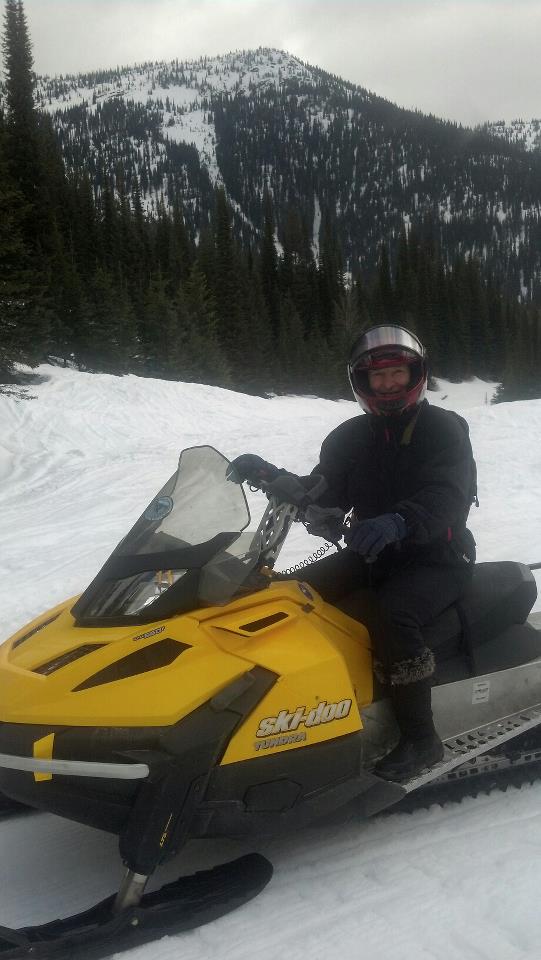I am about to drive off a cliff.
I’ve just maneuvered a 400-pound snowmobile down a steep, narrow chute and am traveling fast enough to miss the sharp right turn onto the main trail.
Instead, I continue straight, managing to brake only when the tips of the Ski-doo’s runners are hanging over the edge, inches away from sending me head first into the snow drifts and trees.
Somehow, I’m not scared. I remember the guide’s instructions from before we hit the trail that morning. After stopping, I punch the machine into reverse. Slowly I back up, turn the sled’s handlebars to head the runners in the right direction, switch to forward drive, and straighten out onto the trail.
I was snowmobiling last week while on vacation in Montana. As I rode the trail down the mountain, I started thinking of all the ways snowmobiling is like writing.
In stressful situations, it does no good to freak out. The key to overcoming physical or mental roadblocks is to keep panic under control, remember what you’ve been taught, and instead of looking over the cliff, concentrate on extracting yourself from the situation.
That’s a lesson that it’s taken me years to master, in and outside my writing life, and something I have to continually work on.
Writing and snowmobiling
Here are the other ways writing is like snowmobiling:
1. It’s always harder in the beginning.
I hadn’t ridden a snowmobile in a year and had to reacquaint myself with the controls and what it feels like to ride up to 40 miles an hour over snow, ice and slush on two rather skinny runners. It was slow going at first, but I got the hang of it.
Writing is like that too. If you’re just starting out as a freelance writer, or are switching to writing about a different topic or trying out a different type of writing, you’ll encounter lots of bumps as you figure things out. But the more hours you put in, the easier it gets.
2. It helps to lean in to the curves.
When you’re on a snowmobile navigating around a tight corner, you lean into the curve. Sounds counter-intuitive, but leaning in gives you more control.
In writing, backing away from the unknown doesn’t do any good either. For starters, if you back off, you’ll never know how scary — or not scary — an opportunity is. It could be something that you could easily handle, but you’ll never know if you don’t try. If you try and find it is hard, then you figure out how to tackle it. Or decide that it’s not something you care for — but at least you know.
3. Challenge yourself.
I am not a natural thrill seeker. On the ski slopes, I’ll take a nice wide, scenic run over a steep patch of moguls any day. Still, there’s something to be gained from trying new things. Before last year, I’d never driven a snowmobile. Then my middle-school aged son and I took a trip to Montana for spring break and decided to give it a try. Since he wasn’t old enough, I was the driver by default. At first I was nervous, but I figured it out. This year, I still was nervous when early on in the ride the trail turned into a switchback with a nasty drop off on one side that spilled into a tree-covered canyon far below. Stomach churning, I forced myself to focus on the trail in front of me, all the better to knock out the mental image of me falling over the edge.
Eventually, the switchbacks ended and I picked up the rhythm of driving enough to start enjoying myself.
Some writing assignments are hard. Some, if you’re doing something you’ve never done before, may even make you feel sick from fear you won’t be able to do what needs to be done. But you can get over it by breaking down a task into multiple small steps, and focusing on doing the work instead of the possibility of failure.
4. It’s OK to ask for help.
Not being avid snowmobile riders, we hired a guide to help us navigate the trails. It made our half-day outing that much more enjoyable because he knew the terrain, knew where the trail was going to get bumpy and when we took rest stops, shared details about the scenery.
In writing, you don’t need to do everything on your own. Editors are there to guide you. You also can join professional organizations or online writer groups or go to conferences or writing seminars for advice and moral support.
5. In the straightaways, let it fly.
By the end of our half-day excursion, I was comfortable enough on the straighter parts of the trail to stand up on the running boards and let ‘er rip.
Work doesn’t always have to be hard. When you’ve reached a certain level of mastery, relax and enjoy the ride — you’ve earned it.
